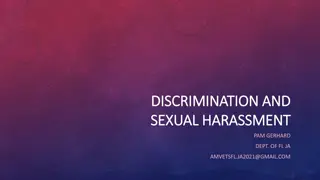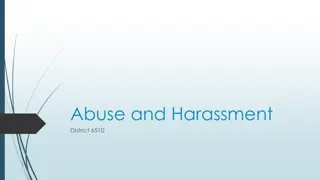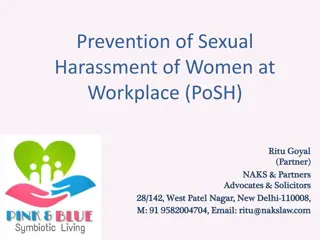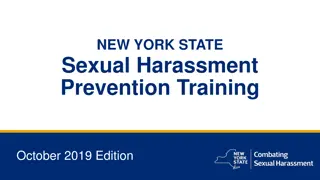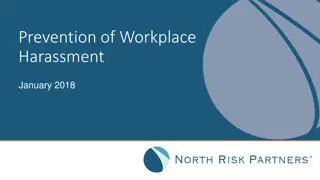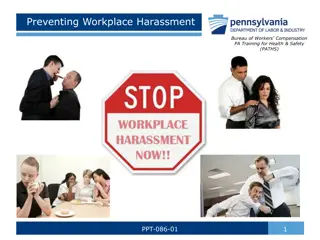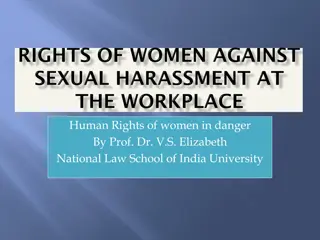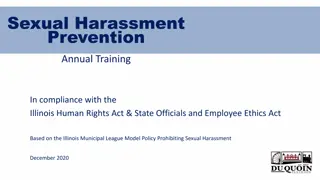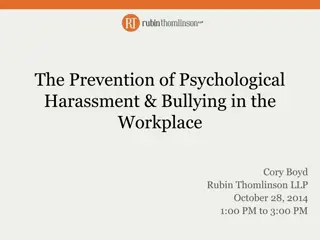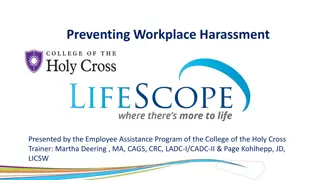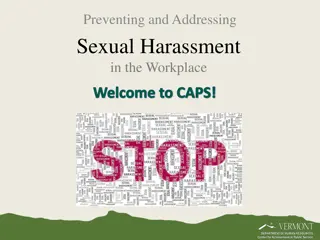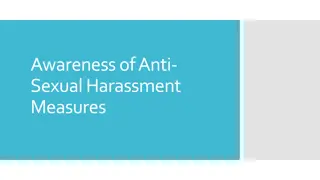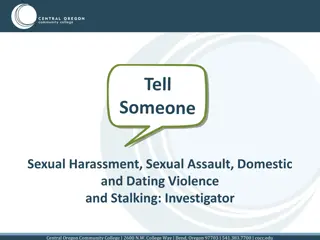Addressing Sexual Harassment in the Biomedical Workplace: NIH Seminar Overview
Explore how the NIH handles allegations of sexual harassment in the biomedical workplace through policies, procedures, and support for a safe work environment. Learn about panelists and NIH guidelines for addressing and reporting incidents. Find out the impact on research awards and the process for notifying NIH of personnel changes affecting awards. Discover updated guidance for changes in status related to workplace concerns. Access resources and contact information for handling allegations through the NIH Office of Extramural Research.
Download Presentation

Please find below an Image/Link to download the presentation.
The content on the website is provided AS IS for your information and personal use only. It may not be sold, licensed, or shared on other websites without obtaining consent from the author. Download presentation by click this link. If you encounter any issues during the download, it is possible that the publisher has removed the file from their server.
E N D
Presentation Transcript
Addressing Sexual Harassment in the Biomedical Workplace NIH VIRTUAL SEMINAR 2020
Our Panelists MICHAEL S. LAUER, M.D MICHELLE BULLS PAULA GOODWIN, PH.D Deputy Director for Extramural Research National Institutes of Health Director, Office of Policy for Extramural Research Administration (OPERA) Office of Extramural Research, NIH Program Administration Officer Office of Extramural Research, NIH 2
NIH Policies on Safe Work Environment NIH GPS Section 4: NIH recipients are expected to provide safe and healthful working conditions for their employees and foster work environments conducive to high-quality research. NIH expects that institutions: Develop and implement policies and practices that foster a harassment-free environment Maintain clear, unambiguous professional codes of conduct Ensure employees are fully aware and are regularly reminded of applicable laws, regulations, policies and codes of conduct 4
Notifying NIH Impact on Awards NIH requires recipient organization to proactively notify NIH of changes in senior/key personnel status that impact the ability of the employee to continue in their role on the award. For example: Restricting access to campus/lab space Restricting ability to interact with students Placing the employee on extended administrative leave, when they cannot perform their duties Institutional officials should contact the NIH Grants Management Specialist listed on the Notice of Award to request a change in PI or notify NIH of any issues impacting the award 5
Updated Guidance regarding Change in Status: PD/PI and Recipient Institution Change in PD/PI/key personnel requests and requests for change in recipient institution should include: mention as to whether the change is related to concerns about safety and/or work environments (e.g. due to concerns about harassment, bullying, retaliation, or hostile working conditions). This information allows NIH to make informed grant-stewardship decisions regarding matters including, but not limited to, substitute personnel and institutional management and oversight. Learn more: NOT-OD-20-124 NOT-OD-20-124 https://grants.nih.gov/grants/policy/harassment.htm https://grants.nih.gov/grants/policy/harassment.htm 6
NIH Process for Handling Allegations NIH Office of Extramural Research (OER) receives allegations centrally via harassment mailbox and webform granteeharassment@nih.gov https://grants.nih.gov/grants/policy/harassment/find-help.htm Institutions are encouraged to use this mailbox to contact OER with questions or when concerns arise regarding harassment at your institutions. When NIH learns of an allegation of harassment that may impact NIH- funded research, we will contact the recipient institution to learn more 7
NIH website grants.nih.gov/grants/policy/harassment grants.nih.gov/grants/policy/harassment Resources Contact NIH: https://public.era.nih.gov/shape/public/index.era Webform: https://public.era.nih.gov/shape/pu blic/index.era https://public.era.nih.gov/shape/public/index.era GranteeHarassment@od.nih.gov Email: GranteeHarassment@od.nih.gov
DISCUSSION & QUESTIONS 9

 undefined
undefined








